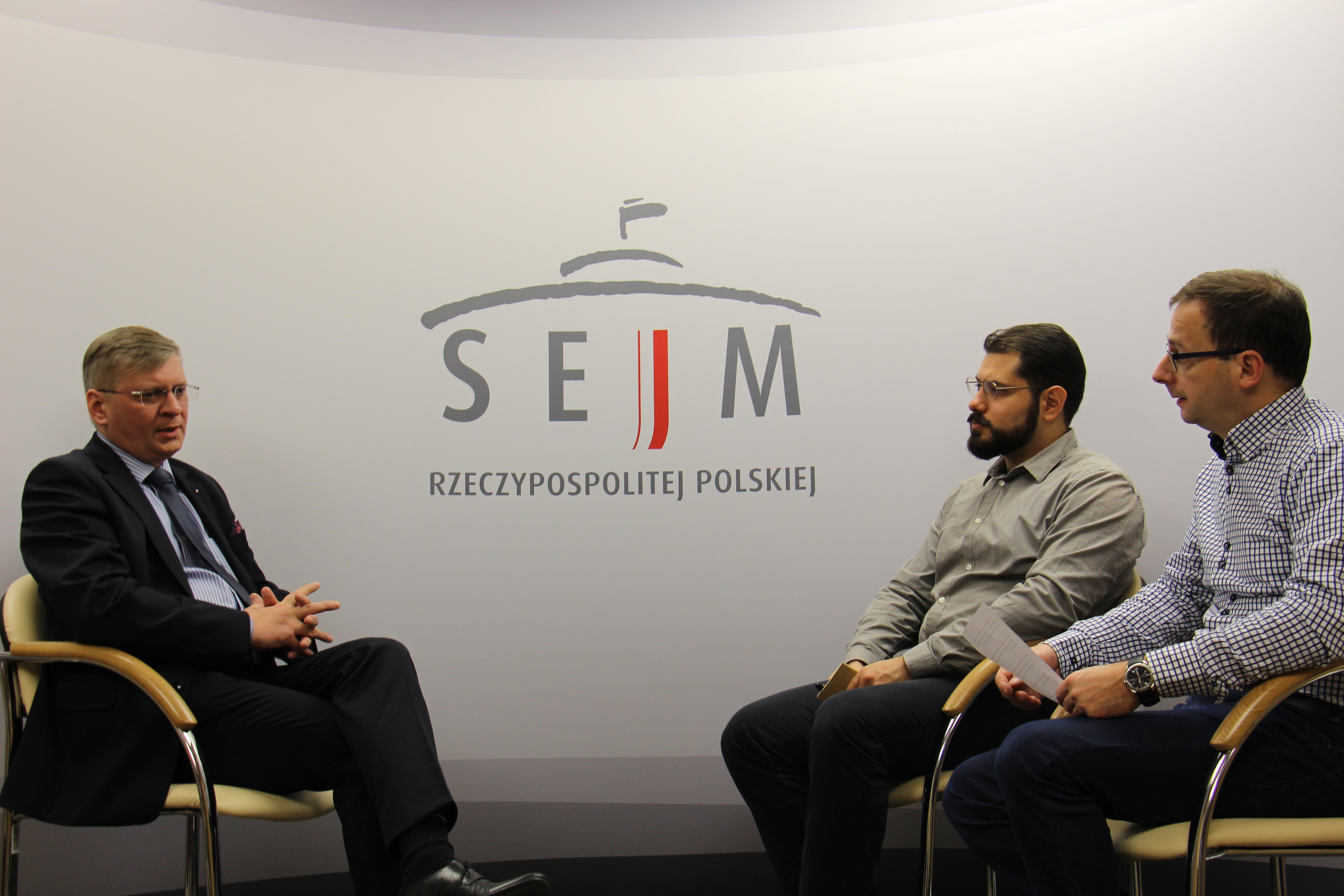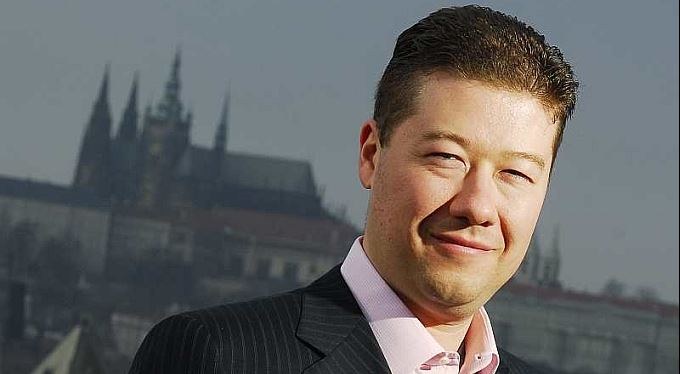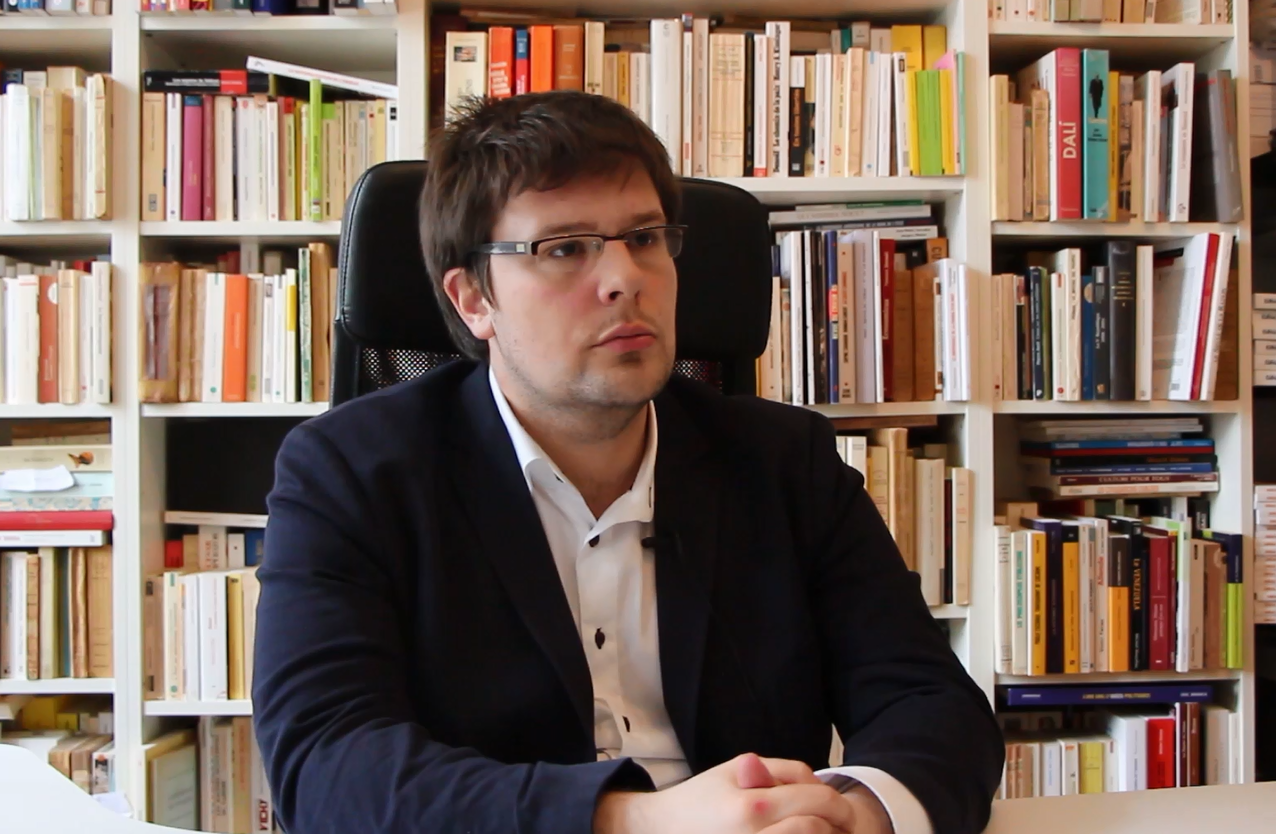Poland, Warsaw – Interview with Maciej Szymanowski, Polish historian and diplomat, adviser for International Affairs to the Marshal of the Polish Sejm, V4 specialist: “The Visegrád Group is the symbol of a successful transition following the fall of communism”.
In mid-November, Ferenc Almássy and Olivier Bault met Maciej Szymanowski, the councilor of the Marshal of the Diet (Speaker of the House) as a specialist in international affairs and the Visegrád Group. Maciej Szymanowski is a historian and political scientist, but has also been a journalist for various media in the Visegrád countries and a lecturer at the Catholic University of Budapest. He has previously headed the Polish Institutes in Budapest and Prague, and he speaks the four languages of the Visegrád Group. Mr Szymanowski answered questions from the Visegrád Post in the Polish Diet in mid-November 2017.

Ferenc Almássy: I would like to start with a personal question. Why did you choose Hungary as a center of interest?
Maciej Szymanowski: By laziness! When I was a high school student in Katowice, I learned English and Russian, which were compulsory at the time, and also Latin. The Latin teacher was very demanding, and I spent the whole week working hard because of Latin. I had no time for maths and Polish. But I knew that those who had Hungarian as third language had time to party as well as for other matters. And so initially I chose the Hungarian course by laziness, without having ever been in Hungary. I could have chosen Czech instead of Hungarian. But the Czechs did not have a very good image at the time in Poland and in my family we did not like them. I could have still learn Czech at university. I was in Yugoslav philology, so I was focused on Serbia and Croatia. And since I had good marks at the exams, I was offered not to waste my time with the Balkans and to do Czech, but I refused. I speak of this because it is a good illustration of the fact that God has humor. Twice, I did not want to do Czech, and finally I had to learn it anyway because I married a Czech.
FA: And so at first your interest in Hungary was dictated by laziness, but you persevered in that choice. You led the Polish Institute in Budapest and Prague. What led you to focus more generally on Central and Eastern Europe and the Visegrád Group?
Maciej Szymanowski: It’s a fascinating part of the European continent. Just take your car and drive a few hours to cross the borders of several countries, change language, culture and even gastronomy. This diversity of Central Europe, which is part of the West – at least the part of Central Europe where I travel – has always fascinated me. That’s what led me to focus on this part of Europe.
FA: You speak of Central Europe to designate among others the countries of the Visegrád Group. In the European Union, these countries stand out as a coherent group, which often speaks with one voice. But in the west of the continent, in France for example, one speaks of the Visegrád Group as being Eastern Europe.
Maciej Szymanowski: First a little geography: where is Central Europe? I say that Central Europe is where the center of the continent is, in the geographical and mathematical sense. This center of the continent is designated in Prague, in the central square of the Old City, and also in Suchowola in Poland, Kremnica in Slovakia and Tállya in Hungary. There is even a center of Europe in Lithuania and Ukraine. Central Europe therefore covers all these countries.
Olivier Bault: On the political side, in the context of the European Union, do you think that Central Europe, and especially the Visegrád Group, are bundled up in one, for example when talking about a two-speed Europe?
Maciej Szymanowski: It’s a difficult question, but I’ll try to answer it. The Visegrád Group, or V4, is formed by four states made up of peoples with a rather difficult history. Like the other peoples of Central Europe, they were confronted with the great Ottoman, Russian and German imperialisms, and they had to struggle in order to survive. But they lasted, and they formed nations often small, but strong. We are very different, but we also have a lot in common. Why are we so different? Do you know, for example, that when it comes to the gene R1a1, Hungarians are closer to Poles than for example Czechs, while Czechs are Western Slavs like we are? But anyway, we also have a lot in common. This is seen, for example, very well when Hungarians, Poles, Czechs and Slovaks go to the West of the continent, or even to another continent, to participate in scientific conferences. They usually sit together at mealtime. In our Western culture, the meal is an intimate moment and it matters to choose with whom we sit at the table. Very often in these conferences, Hungarians, Czechs and Poles sit at the same table. Why ? Because they feel comfortable together. And why do they feel comfortable? Because we have all seen pretty much the same movies, we have read the same books at school and we have common topics for discussion.
FA: It is often said that the Visegrád Group was originally created to facilitate a common integration of its members into the EU and NATO. Were there not other reasons, like this intimacy between our peoples?
Maciej Szymanowski: Yes, because the Visegrád Group has its roots in the famous encounters of the XIVth century and also in many historical events. As for the Hungarians for example, there was a very important battle, lost against the Turks, the battle of Mohács. The Hungarians fought there and fell alongside with the Poles. There were many historic moments where we were side by side. We have also been against each other, but most of the time we were in the same camp. We also have a common heritage of having experienced German nationalist socialism in a particularly aggressive and destructive form, and then Soviet internationalist socialism.
FA: After the elections in Austria, it seems likely that this country is getting closer to the Visegrád Group. Are there other countries in central and eastern Europe that could come closer in the near future to the V4 or even join or support the V4 positions in Europe?
Maciej Szymanowski: The Visegrád Group is part of the European Union, as are the Scandinavian countries. But it is also the symbol of a successful transition following the fall of communism in 1989. We have managed to restore democracy and the market economy fairly quickly, even to the point that we sometimes have problems with countries like France which would like to restrict the freedom of movement of services or persons. The V4 has therefore shown that it is possible in this region of Europe to do things quickly and well, and it is a model for Ukraine, Belarus and other countries. For years now, the V4 has also a V4+ formula, which is a framework of cooperation with other countries in specific areas or goals. One of our major objectives at the moment is, for example, to develop a network of highways and transport routes on the north-south axis, that is from Scandinavia to Croatia as well as an energy network at the same level as in the western part of the European Union. For example, at the moment we are building the Via Carpatia to connect eastern Poland with Slovakia and Hungary. In the long run Via Carpatia will go from Lithuania to Croatia, and maybe even to Turkey. Poland has built an LNG terminal and is going to expand it. The idea is that the gas that arrives through the Baltic Sea, just like the gas that will pass through the island of Krk in Croatia, can be sent to other countries in the region.
FA: The construction of a north-south axis is a strategic objective for Poland. This is also the goal of the Three Seas Initiative. In a context of tensions between the US and Russia, does this not risk to turn this region into a buffer zone between Russia and the West of the continent?
Maciej Szymanowski: I hope not. The Three Seas Initiative is about major infrastructure projects between countries in the eastern part of the EU. Of course, they will have an impact on countries that are not part of the EU, and for some that do not want to join the EU but simply want to have good relations. We strive to take this into account because the EU was originally created to unify the continent as a whole, not to divide it. With regard to the geopolitical aspects of these projects, it is difficult to answer in a few sentences. However, I am convinced that the tensions between Washington and Moscow, and also between Warsaw and Moscow, will inevitably diminish sooner or later, because the confrontation policy is not in the interest of Russia. In the long run, such a policy is very damaging, especially for the Russian Federation. Russia has enormous problems with its economy and its demography, for example with the depopulation of Siberia, and it still has many other problems. All this means that, in the long run, it will not be able to support such a confrontational policy.
FA: What is the relationship of the V4 to other powers, like China for example? Can we talk about foreign relations of the V4, or should we speak separately of relations between each country of the V4 and these powers?
Maciej Szymanowski: In my opinion, as Visegrád Group, we have very close foreign policies, which give priority to membership of the EU and NATO. Poles and Hungarians are more pro-EU. They are 70-80% satisfied with their membership of the European Union. This is a little less true in Slovakia and the Czech Republic, but we can say that we are nevertheless all globally pro-EU and pro-NATO. It’s a security issue for us. Our policies are therefore within the framework of NATO and the EU, including vis-à-vis the world outside this Euro-Atlantic framework, such as China. There is this great Chinese project, the New Silk Road, and all the V4 countries are participating. Nor is there any major difference between Polish foreign policy and, for example, the Czech or Hungarian ones. Essentially, we agree with each other.
OB: Are there not still important contradictions between the relationship of Poland with Russia and that of Hungary or Slovakia with Russia? The leaders of Hungary, Slovakia and the Czech Republic often say that the sanctions imposed after the annexation of Crimea must be lifted.
Maciej Szymanowski: We have to talk about differences between Russia’s relationship with Poland and Russia’s relation to other V4 countries. It’s a classic strategy of division. A typical example of this Russian strategy is the wreck of the Polish government plane that crashed in Smolensk in 2010 and its black boxes, which Russia refuses to return to Poland.
OB: You think this is an intentional provocation?
Maciej Szymanowski: Yes. This is clearly a provocative strategy in order to break a corner in the Visegrád Group and the Three Seas Initiative. Russia does not like this type of cooperation in this part of Europe when it is not part of it. For our part, we know that only cooperation in Central Europe gives us a guarantee of development and peace.
FA: You have told us that on the long run the tensions between Russia on the one hand and Western Europe and the United States on the other hand should decrease. Do you think this will be a chance for the V4 to really become the center of the continent, between Russia and the West? Especially after the construction of infrastructure on the north-south axis, this part of Europe could be at the crossroads between the West and the East.
Maciej Szymanowski: We certainly do not want to be at the crossroads between the West and the East, we just want to be part of the West with good infrastructure to connect people to each other. I mentioned the specificity that distinguishes central Europe from the western part of the continent, such as the different experience of the Second World War or the fact that it was occupied successively by the Germans and then by the Soviets. For us, the Second World War ended in 1989, and even more exactly in 1993 in Poland and in 1991 in Hungary, when the Soviet army left our respective territories. This makes us have a different view of the past, for example compared to the French. Nevertheless, this part of Europe where we find ourselves has never fought the western part of Europe, because we are part of what is called Western, Latin, Christian culture, which is based on Greek philosophy, Latin law, etc.
FA: Do not you think that, within the framework of the European Union to which this part of Europe should adhere to the same conditions as the others, we have seen the development of a domination, especially economic and especially German, and that Central European countries are not equal partners in the eyes of those in the West?
Maciej Szymanowski: Most economists find that the eurozone is more favorable to the German economy than the Italian or Spanish economy, for example. It is an established fact. But we are not in the eurozone and that does not affect us. We have different problems with the payment of taxes. German or French companies often flee taxes in Poland, but this is a broader phenomenon, not only in the countries of our region. Conversely, the V4 countries have a trade surplus with Germany, unlike France.
OB: In the European Union, Poland and Hungary face fairly brutal attacks and are accused of violating European values, democratic principles, and so on. Are the causes of these attacks the same for both countries?
Maciej Szymanowski: There are indeed similarities. A sort of mental iron curtain still exists. In Western Europe, the level of knowledge about our part of Europe is very low, because of the communist era and the cut that it has represented. In 2012, the previous Polish government carried out a study with questions like: Do you know a Polish city or personality? As for cities, 38% of Germans were unable to name Krakow or Warsaw. Among the French and British, this proportion was 62 or 63%. The problem is, first of all, that we are still very poorly known. And then there are of course other factors that come on top of that. The current governments in Poland and Hungary are of right wing, and this differentiates them, in terms of values and policy, from the governments of Emmanuel Macron or Angela Merkel. This is perfectly natural: governments are changing and that is what makes Europe so diverse. In the face of these attacks, we must remain calm. And too bad if some political leaders tend to comment on the problems of other countries more often than on those of their own country.




